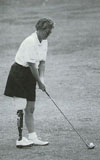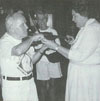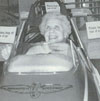Volume 29, Number 5 September/October 1998
Recreation StoriesProfiles of five people with disabilities who say sports and leisure activities play an inspirational role in their livesBy Michael McNicholas
Recreation professionals work very hard to ensure that all persons, no matter what their abilities, have an opportunity to experience recreation. We strive to find activities, sports and events that will increase quality of life, and create a lifelong path on which people with a wide range of abilities walk. We can find that it can be hard to always deliver our message and service with a smile. Therefore, it is important to hear about the successful delivery of our message. There are many wonderful stories and examples of the impact of recreation in the lives of different individuals. The following stories exemplify how recreation has stoked the fires of inspiration for five Individuals.
Brenda Bessie Brenda Bessie is an engaging, high-spirited woman and a role model. In 1981, at age 23, she was involved in a combine accident that caused her to become an above-the-knee amputee. This did not break her spirit nor did it quell her competitive drive.
Brenda Bessie is an engaging, high-spirited woman and a role model. In 1981, at age 23, she was involved in a combine accident that caused her to become an above-the-knee amputee. This did not break her spirit nor did it quell her competitive drive.
"The impact of my story has been incredible," says Bessie, a native of Whiteside County. "I never expected people to call or write about what I've gone through and what I am doing. Losing a limb is as great a loss as losing a loved one. But I just couldn't wallow in the dark side of life. I had to play again. So in that way, I guess I can be an inspiration." Bessie has always worked hard and played harder. Throughout her childhood, she belonged to a 4-H and her family owned a herd of 100 purebred Angus cattle and breeding stock. In her free time Brenda played sports. Says Bessie: "My two brothers would always play games with my sister and I. We'd play ball, run game drills... the whole family would get involved." She was a star softball and basketball player in high school and college, but the game she worked the hardest at was golf. "My whole family loves to golf," says Bessie. "I am just more competitive about it. I wanted an answer for my competitive drive." That is why she got a NovaCare sports leg in 1989. Her parents, Joe and Millie Bessie, brought home a set of Tommy Armour graphite clubs and told her it was time to start playing golf again. She struggled with the lack of prosthetic advancement, until she discovered the NovaCare Research facility based in Oklahoma City, Okla. "The flexible Fabolich socket offers the ultimate in stability and comfort," says Bessie. "The College Park TruStep offers excellent absorption and the surest footing available. The sport leg I have now has better mobility and only weighs 5.5 pounds. So having a prosthetic leg is no longer a burden. "It has been hard to work through all the fittings, changes and comfort issues that one goes through in this process. But the trips to the pool on my days off are very therapeutic." Bessie goes to her cousin's pool in the summer. Swimming in Geneseo Park District's facility in the winter is also a big favorite. She has come back in true champion fashion. She has won more than 30 golf invitationals and opens in the past seven years and has continued her torrid pace this summer becoming Ladies Champion at the Brickyard Classic Speedway in June, the Michigan State Invitational in July, and the Wisconsin Invitational in August. 20 | Illinois Parks and Recreation "It has been a great run," says Bessie. "I couldn't have done it with out the wonderful support of my parents. I consider myself fortunate to have lived through, but the other half of the battle was won due to my huge support base. I think my parents are the cat's meow." Bessie considers her childhood to be perfect, and she is humble about her circumstances. She says: "In college I thought I had the world by the tail. But since then, I have become more aware and sensitive to people with disabilities. My personal injury made me tune in to people who were less than perfect. People I would have missed the opportunity to meet." At a recent golf outing in Coal Valley, 111., a PGA tour stop called the Quad City Classic, she spent time with Casey Martin. While Bessie is not a "politico," she did have this to say about the Casey Martin situation: "I know of no way to scientifically determine if the use of a golf cart would provide an unfair advantage. However, there are other solutions than simply refusing someone the opportunity to compete because they have a disability. We need to remember that this is a civil rights issue. Times have changed, and attitudes must change with the time. Individuals must be judged on their assets, rather than their deficits. I hope this situation can be viewed as an opportunity to learn from Mr. Martin and not as something to fear!" Summer is Bessie's busiest time of the year. She competed in three tournaments in July and three in August. Since she has become involved in the purebred cattle business again, fall will also be busy. Last fall she purchased a share in the Sybil syndicate, a Brown Swiss, which sold at the Royal Harvest Sale in Elkhorn, Wis. This year the syndicate acquired several additional show heifers that are wintering at Tierra Verda in Greenville, Tex. This endeavor has taken Brenda to state fairs in Illinois, Wisconsin, Iowa, Arizona, Texas and The World Dairy Expo held annually in Madison, Wis. These heifers have showed for top honors. Brenda would stand for nothing less. ž
Louie Lopardo & Dolly Lyons
 Brother and sister Louie Lopardo and Dolly Lyons share more than their family ties, a home in Cicero, and challenging visual impairments that developed later in life; they have a deep and personal appreciation of recreation.
Brother and sister Louie Lopardo and Dolly Lyons share more than their family ties, a home in Cicero, and challenging visual impairments that developed later in life; they have a deep and personal appreciation of recreation. "Dolly and I always loved to be active," says Lopardo. "Dancing and roller skating were a big part of our lives for so long. It was hard to find new activities to replace them." That is when West Suburban Special Recreation Association (WSSRA) had the joy of beginning to serve Louie and Dolly. WSSRA has provided special recreation services for the sibling duo since 1980. It was then that the two were in a camp for persons with visual impairments. Says Lopardo: "We heard from a friend at the camp about an exercise program that had just started with WSSRA. We could take a cab to the basement of a church, and the program seemed to balloon from there." September/October 1998 | 21 The pair soon found many friends to join the little group. Louie says that "Recreation staff soon found that blind people can really do a lot" Lyons adds: "The staff members have always helped us try new things and listened to our ideas. Sandra Gbur and Marianne Birko have been an inspiration. If it wasn't for their ideas and efforts to listen to our ideas, where would we be?" "We have been very grateful for the chance to get out and do things," says Lopardo. "It isn't easy to get transportation to go out and do things." Lopardo has been retired for 12 years and was never married. Lyons moved in with him after her husband passed away, and they have been living together ever since. The couple reside in the Clyde Park District, and enjoy a wide variety of the district's programs. "We've done so many activities over the years, it gets hard to remember them all," says Lopardo. "My week is usually quite busy with activities. It is important to me." Every week, the two have a full schedule of WSSRA activities. On Tuesdays they participate in a walk and dine program at nearby Proksa Park. On Wednesdays, they play cards in preparation for the quarterly Uno tournaments. On Thursdays, they go to the Norridge Center to hear a band or learn to make bread, candy and cheesecake. They really get active on Thursday night when they go out ballroom dancing. Lopardo says: "I love to help the new people learn how to dance. It is great to help young people take interest in things I have always loved to do. "I love going swimming on Friday morning because I get to enjoy a long soak in the hot tub. I may not be able to do the whole routine the instructors had in mind, but I love that hot tub! "It is hard, being totally blind, to do things and set up transportation, so I really appreciate WSSRA and thank God for all of their hard work." Lyons echoed her brothers sentiment and added: "Those young people really seem to enjoy the dancing and helping that they do with us." She also remains very actively involved in recreation. Aside from the programs she shares with Louie, they used to do a 5 K walk in every June. Lyons says: "We tried ice skating and it was really hard, but I could never have done it without WSSRA. The specialists, and guides gave us the opportunity to do these things. They are what makes it possible." Lyons has also become a bit of a card shark. "I never played cards before WSSRA. A recreation specialist helped me to get involved. I have won WSSRA Uno tournament two times and Louie and I have a card club of our own." Aside from the weekly routine, they annually attend an overnight trip in September. This year they'll go to Mackinac Island. Sounds like another adventure for the dynamic duo. ž
David Zoellner
Hard work and effort are staples in Zoellner's life. The job at the Weber Grill plant is long and hard, starting at 4:30 a.m. and working until 2:30 p.m. around metal and fire. He describes his workplace as follows: "It's hot in that place! You have to burn the iron out of the casting so the paint sticks. It's a lot of walking around and hustle, hustle. They want you to do everything." Zoellner has also signed on to be a Global Messenger for Special Olympics. " Basically, if there is a show or competition, I go and try to recruit volunteers and kids with disabilities," he explains. "Our goal is to increase the number of kids by 30 to 40 percent." He is dedicated to Special Olympics and finding recreation opportunities for kids. He made a special trip, with Northwest Suburban Special Olympics area director Karen Milligan, to Normal, 111. It was here that he lobbied and voted for more sports like tennis and cycling to be included in what Special Olympics sports offer persons with disabilities. Dave continues to help people to understand the message about the benefits of Special Olympics and recreation. "I just like helping," he says. "I like to give them a little of what I have got." And maybe a little more. ž
Matthew O'Boyle
Matthew O'Boyle is a 22-year-old with a lot going for him. |
September / October 1998 | 23
 It is a very hot day in mid-July, and Dave Zoellner has just come home from a long day at his job at the Weber Grill Plant in Palatine. He is very tired but excited, because he's taking a phone call about his involvement in Special Olympics, his passion.
It is a very hot day in mid-July, and Dave Zoellner has just come home from a long day at his job at the Weber Grill Plant in Palatine. He is very tired but excited, because he's taking a phone call about his involvement in Special Olympics, his passion.